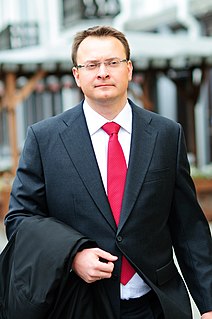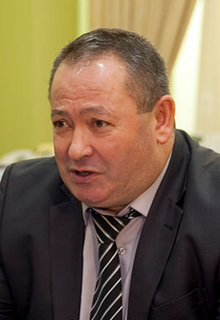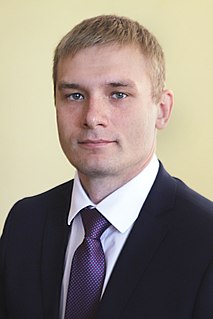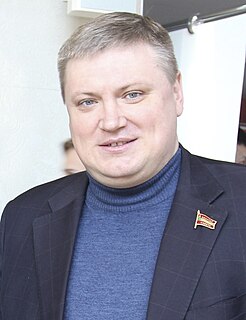
The Armed Forces of the Republic of Belarus consist of the Ground Forces and the Air and Air Defence Forces, all under the command of the Republic of Belarus Ministry of Defence. Being a landlocked country, Belarus has no navy.

The politics of Belarus takes place in a framework of a presidential republic with a bicameral parliament. The President of Belarus is the head of state. Executive power is exercised by the government, at its top sits a prime minister, appointed by the President. Legislative power is de jure vested in the bicameral parliament, the National Assembly, however the president may enact decrees that are executed the same way as laws, for undisputed time. Belarus's declaration of independence on 27 July 1990, did not stem from long-held political aspirations but from reactions to domestic and foreign events. Ukraine's declaration of independence, in particular, led the leaders of then Belarusian SSR to realize that the Soviet Union was on the brink of dissolving, which it did.

Belarus elects on national level a head of state - the president - and a legislature. The president is elected for a five-year term by the people. The National Assembly has two chambers. The'House of Representatives has 110 members elected in single-seat constituencies elected for a four-year term. The Council of the Republic has 64 members, 56 members indirectly elected and eight members appointed by the president.

The Checheno-Ingush Autonomous Soviet Socialist Republic, or Checheno-Ingush ASSR was an autonomous republic within the Russian SFSR. Its capital was Grozny.

The president of the Republic of Belarus is the head of state of Belarus. The office was created in 1994 with the passing of the Constitution of Belarus by the Supreme Soviet. This replaced the office of Chairman of the Supreme Soviet as the head of state. The tasks of the president include executing foreign and domestic policy, defending the rights and general welfare of citizens and residents, and upholding the Constitution. The president is mandated by the Constitution to serve as a leader in the social affairs of the country and to act as its main representative abroad. The duties, responsibilities and other transitional clauses dealing with the presidency are listed in Chapter Three, Articles 79 through 89, of the Constitution.

The Party of Freedom and Progress is a liberal political party in Belarus. Since 2003, it has continuously failed to reach the minimum threshold to get an official registration by the electoral commission.
Dr. Piatro Sadoŭski is a Belarusian linguist, politician and diplomat.

Parliamentary elections were held in Transnistria on 12 December 2010. All 43 seats of the Supreme Council of Transnistria were up for election. Transnistria uses first past the post with 43 single seat constituencies.

Ales (Alaksiej) Anatoljevich Michalevic is a Belarusian public figure and politician, candidate in the 2010 Belarusian presidential election.
Vyacheslav Nikolayevich Kuznetsov, in Belarusian: Вячаслаў Мікалаевіч Кузьняцоў, is a Belarusian politician and diplomat.

Vladimir Vladimirovich Kumets is a Belarusian dissident and political activist. In September 2011 he was recruited by the KGB against his will and forced to leave Belarus. He is a press secretary for the Revolution Through Social Networks civil campaign and a Deputy Chairman of the Integration Bridge foundation in Poland.

Parliamentary elections were held in Transnistria on 29 November 2015, alongside municipal elections.

This is a list of the Permanent Representatives of Belarus to the United Nations. Permanent Representative is a head of the permanent mission of Belarus to the United Nations. The current office holder is Valentyn Rybakov, since August 7, 2017.

Elections to the Supreme Council of Khakassia took place on Common Electoral Day 9 September 2018. The Supreme Council is elected for a term of five years, with parallel voting. 25 seats are elected by proportional representation from party lists with a 5% electoral threshold, the whole Republic forming a single constituency, and another 25 seats are elected in single-member constituencies using the first-past-the-post system.

The State Border Committee of the Republic of Belarus, GPK manages the international borders of Belarus. Its armed paramilitary force is known as the Border Guard Service, It carries out committee orders and policy. The service covers the borders with Russia, Ukraine, Poland, Lithuania and Latvia.

Oleg Olegovich Khorzhan is a Transnistrian lawyer and politician who has been chairman of the Pridnestrovie Communist Party since May 2003. He served as a member of Transnistria's Supreme Council from 2010 until his arrest and imprisonment in 2018. He is considered a political prisoner by his supporters and the UPC–CPSU.
2007 25th convocation local councils of Republic of Belarus elections were held on 14 January.

2010 26th convocation local councils of Republic of Belarus elections were held on 25 April.














